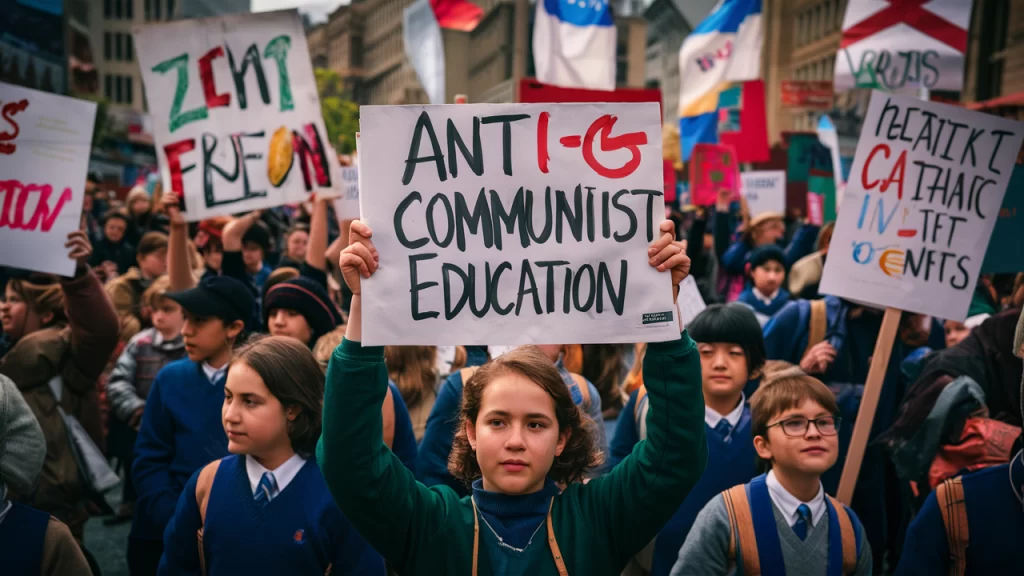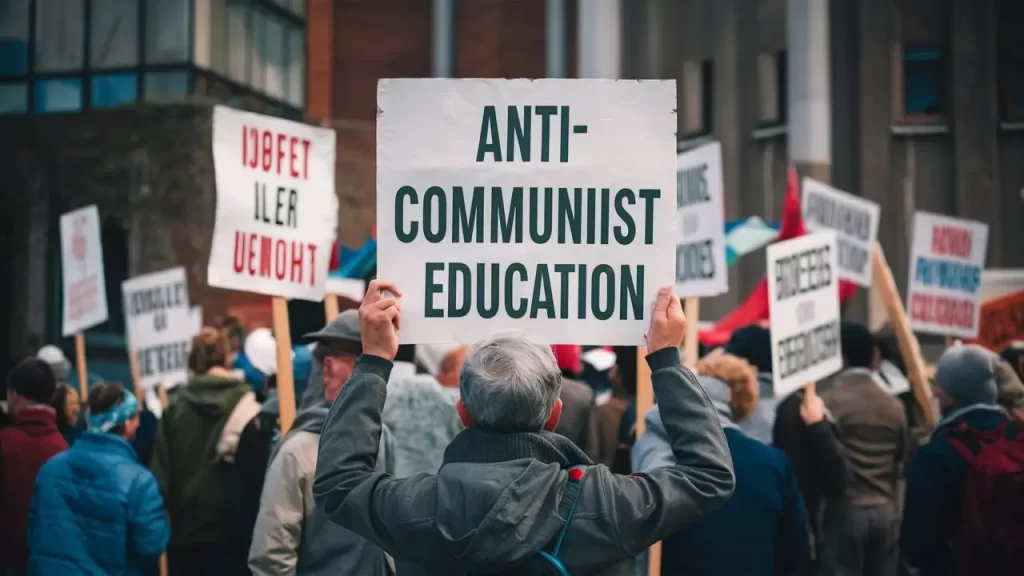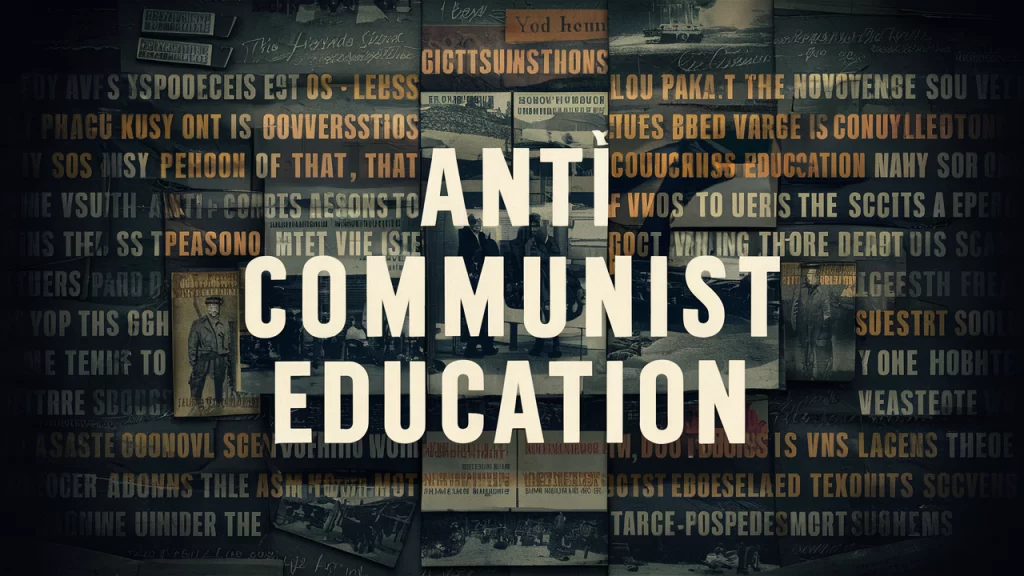Table of Contents
Understanding anti-communist education is essential in today’s world. This type of education offers valuable lessons about the dangers of totalitarian regimes and the importance of preserving freedom and democracy. Let’s explore the various aspects and powerful lessons of anti-communist education.
The Importance of Anti-Communist Education
Why Teach Anti-Communism?
Anti-communist education is crucial for preserving democratic values and freedoms. It helps students understand the historical context and consequences of communism, promoting critical thinking and awareness of political ideologies.
Historical Context
Communism has played a significant role in global history, with regimes that have led to significant human suffering. Teaching about these regimes helps prevent repeating past mistakes and fosters a deeper appreciation for democratic values.
Critical Components of Anti-Communist Education

Historical Events and Figures
Understanding the key events and figures in communist history is fundamental to anti-communist education. This includes studying the Russian Revolution, the rise of the Soviet Union, and the impacts of leaders like Joseph Stalin and Mao Zedong.
Significant Historical Events
- The Russian Revolution: The overthrow of the Tsarist regime and the Bolsheviks’ rise.
- The Great Leap Forward: Mao Zedong’s campaign in China led to widespread famine and death.
- The Cold War: The global struggle between the communist Soviet Union and the democratic Western nations.
Impact on Human Rights
Communist regimes have been associated with severe human rights abuses. Educating students about these abuses highlights the importance of safeguarding human rights and freedoms.
Examples of Human Rights Abuses
- Gulags in the Soviet Union: Forced labor camps where millions suffered.
- The Cultural Revolution: A period of severe political repression in China.
- The Khmer Rouge: The Cambodian regime responsible for mass genocide.
Political and Economic Consequences
Anti-communist education also covers the political and economic failures of communist regimes, including the inefficiencies of planned economies and the suppression of political dissent.
Economic Failures
- Planned Economies: Lack of innovation and productivity leading to economic stagnation.
- Shortages and Famine: Poor planning causes widespread food shortages and famine.
Political Repression
- Suppression of Dissent: Harsh penalties for political opposition.
- Lack of Freedoms: Restrictions on freedom of speech, assembly, and press.
Teaching Methods in Anti-Communist Education

Engaging Lessons
Effective anti-communist education involves engaging and interactive lessons. Using multimedia resources, such as documentaries and interactive timelines, helps bring historical events to life.
Examples of Engaging Methods
- Documentaries and Films: Visual storytelling to illustrate the impact of communism.
- Guest Speakers: Inviting survivors or experts to share their experiences.
- Interactive Projects: Creating timelines or role-playing historical events.
Critical Thinking and Debate
Encouraging critical thinking and debate is essential. Students should be encouraged to analyze different perspectives and discuss the merits and drawbacks of various political systems.
Debate Topics
- Communism vs. Democracy: Comparing the ideologies and their outcomes.
- Human Rights: Discussing the importance of protecting human rights in any political system.
Field Trips and Museum Visits
Visiting museums and memorials dedicated to the victims of communism provides tangible insights. These visits can profoundly impact students, helping them connect with the historical realities of the past.
Suggested Field Trips
- Holocaust and Genocide Museums: Learning about the atrocities committed under totalitarian regimes.
- Historical Sites: Visiting locations significant to the history of communism.
The Benefits of Anti-Communist Education
Promoting Democratic Values
One of the main benefits of anti-communist education is the promotion of democratic values. Students learn the importance of freedom, democracy, and human rights, essential for a healthy society.
Key Democratic Values
- Freedom of Speech: The right to express opinions without censorship.
- Rule of Law: Ensuring everyone is subject to the law.
- Human Rights: Protecting the inherent rights of every individual.
Encouraging Critical Thinking
By studying the complexities of communism and its impacts, students develop critical thinking skills. They learn to question and analyze information, which is crucial in today’s information-rich world.
Skills Developed
- Analytical Thinking: Evaluating historical events and their consequences.
- Debate and Discussion: Forming and defending opinions on complex topics.
Preventing Historical Amnesia
Anti-communist education helps prevent historical amnesia. Society can avoid repeating the same mistakes by remembering and understanding past atrocities.
Importance of Remembering History
- Learning from the Past: Using historical lessons to inform present and future decisions.
- Honoring Victims: Acknowledging and remembering those who suffered under communist regimes.
Also Read: Education Connectivity: Revolutionizing Learning for Success
Final Thoughts
Anti-communist education is vital for understanding the significant historical, political, and social impacts of communism. By learning about the past, students can appreciate the value of democratic freedoms and human rights. This education fosters critical thinking, promotes democratic values, and helps prevent the repetition of historical atrocities.
The lessons learned from anti-communist education are powerful and essential. They equip students with the knowledge and skills to uphold democracy and protect human rights. By uncovering these lessons today, we ensure a more informed and conscientious society for the future.



